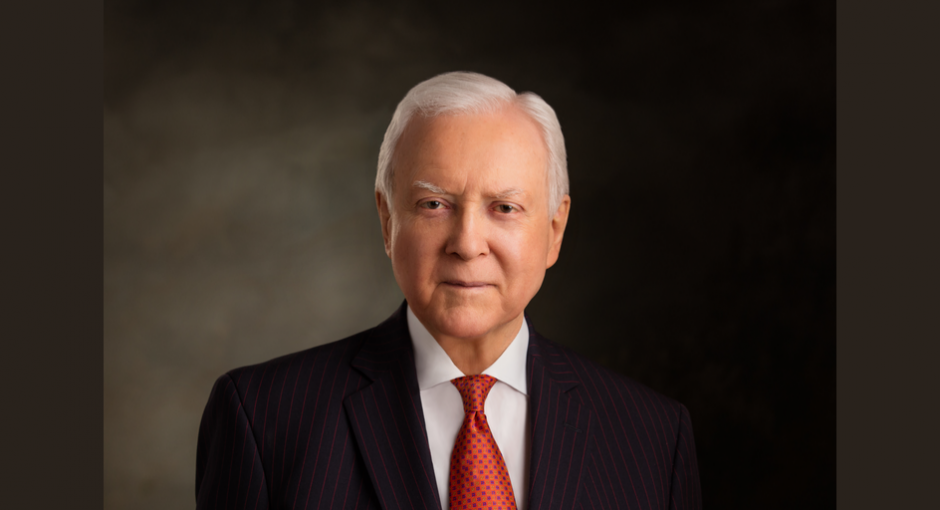Retired U.S. Sen. Orrin Hatch of Utah, a conservative Republican icon who helped create and shape the 340B drug pricing program, has died. He was 88.
Hatch personally was responsible for choosing one of the 340B program’s most important covered entity eligibility criteria—the requirement that disproportionate share (DSH) hospitals have a Medicare DSH adjustment percentage greater than 11.75% for the most recent cost reporting period that ended before the calendar quarter involved. Children’s hospitals and free-standing cancer hospitals, neither of which have a Medicare DSH adjustment percentage, must be able to show that, if they had one, it too would be above 11.75%. A hospital with a 11.75% DSH adjustment percentage translates into a little less than 30 percent of its inpatients are either Medicaid or Supplemental Security Income (SSI) beneficiaries.
That Hatch—one of the drug industry’s most reliable allies in Congress—had the sole power to pick the DSH adjustment percentage threshold for 340B hospital eligibility and chose to set it below the level sought by liberal Democrats is one of the 340B program’s legendary tales.
Marsha Simon was one of the eyewitnesses. She served on Senate Labor and Human Resources Chair Edward Kennedy’s (D-Mass.) staff during the 1990s when Congress was creating 340B. The committee is now called the Senate HELP Committee. Hatch, the committee’s former chair, at that time was its ranking Republican. Simon, now president of the government relations, advocacy research, and business development firm M.J. Simon & Co., says Kennedy and Hatch “always tried to find common ground” despite their political differences.
Simon continues:
“Near the end of a session of Congress, they would meet with staff over dinner to discuss pending legislation and if there was a way forward. Much to our surprise, as the senator was close to the pharmaceutical industry, Senator Hatch raised the 340B bill and we went to work finding a compromise. As I left that night, Senator Hatch jokingly said, ‘Tell me more about best price.’”
“We reported the bill unanimously but Rep. Henry Waxman, Kennedy’s counterpart on the House Energy and Commerce Committee, raised a new issue—adding some public hospitals’ outpatient clinics. Senator Kennedy wanted to add the hospitals but not at the cost of losing Senator Hatch’s support.”
“We discussed it and decided that Kennedy’s position would be Senator Hatch’s call. I called his staffer, Ann LeBelle, and told her of the House issue and Senator Kennedy’s position. She got back to me with their decision—Senator Hatch would allow the hospitals but only if the eligibility criterion was liberalized to ensure that all hospitals in Utah that qualified as public hospitals were eligible for the drug discounts.”
“Thus, the very liberal Henry Waxman’s hospital DSH percentage was lowered from 12.75% to 11.75% at the request of the very conservative Orrin Hatch.”
Latter 340B Actions Aligned Mostly with Drug Industry
Hatch’s subsequent oversight of the 340B program mostly aligned with the drug industry’s views.
During committee action on the Affordable Care Act, Hatch proposed delaying 340B’s expansion until the Government Accountability Office (GAO) did a study advising whether expansion would be necessary after health care reform. As a compromise, the ACA directed GAO to report on covered entities’ generation of 340B revenues, how 340B prices affect access to drugs, and federal oversight of 340B.
GAO’s subsequent September 2011 report spurred the U.S. Health Resources and Services Administration to begin auditing covered entities and drug manufacturers for 340B program compliance and to require entities to recertify their 340B eligibility annually. HRSA also issued a series of 340B program notices clarifying several 340B policies.
In 2014, the Health and Human Services Department (HHS) Office of Inspector General reported that 340B contract pharmacy arrangements create complications in preventing drug diversion and duplicate discounts and that some contract pharmacies do not offer the discounted 340B price to uninsured patients under such arrangements. Hatch and several GOP congressional colleagues asked for the report. Hatch released a statement saying, “It’s unacceptable that inconsistent, lax oversight has allowed the 340B program to be gamed—jeopardizing its core mission of helping low-income Americans. As this report demonstrates, it’s imperative the Health Resources and Services Administration step up to the plate and perform more aggressive oversight to better guarantee assistance for those it’s meant to serve.”
HRSA tried but was unable to promulgate omnibus 340B program regulations and, when that failed, omnibus program guidance (aka the 340B mega-regulations and mega-guidance).
In 2018, Hatch asked the Trump administration, unsuccessfully, to transfer the 340B program from the U.S. Health Resources and Services Administration (HRSA) to the Centers for Medicare & Medicaid Services (CMS). Hatch chaired the Senate Finance Committee at the time and the transfer would have placed 340B under his committee’s jurisdiction.


